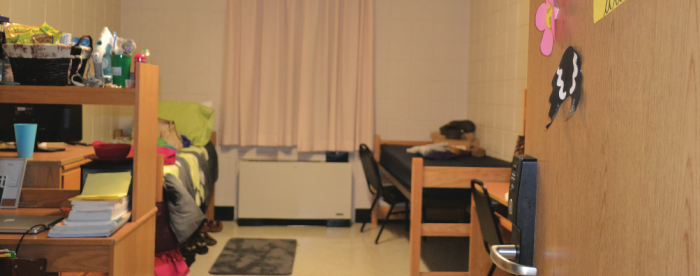By Mimmi Montgomery
Assistant News Editor

Students who dorm at LIU Post have the option of sharing a room or paying a little extra to live alone in a double-room. However, students that end up without a roommate involuntarily could be forced to move or to pay the single-room rate.
Students who pay between $3, 917 and $4,113 for a double- room, could potentially end up paying an additional $400-$500 for a single room.
This is LIU Post’s Consolidation Policy. It has recently been added to the end of the 73-page PDF file that comprises the school’s Student Handbook. The policy states: “When vacancies are created and no waiting list for housing exists, residents who live alone in a double room will be offered the option of maintaining their location at the single room rate. If the resident declines the single room rate option, they may identify a new roommate to fill the vacant space in the room. If the resident is unable to identify a preferred roommate, they will be consolidated to another double occupancy space within their building within ten business days.”
This means that on-campus residents, who involuntarily end up without a roommate, have no other choice but to move in with someone in order to avoid paying extra money.
“Residents get the option of maintaining their room as a single at the single room rate or their Residence Hall Assistant will work to find them a roommate,” explained Jennifer Fuoco, the director of Residence Life.
When it comes to actual costs for living alone in a double- room, information is hard to find. Rates for single-rooms are not listed in LIU Post’s Housing Application, and cannot be found in the Student Handbook.
“The [Resident Assistants] RAs were supposed to inform us about the cost if we were to end up without a roommate, but they did not know the price,” said Theresa Frank, senior Political Science major. “They just said that the charge for people living in a double room with no roommate has to be enforced. I also heard rumors after that there would be a $400 increase, so I feel it’s unclear what is accurate,” she added.
Frank is one of the students who could be affected by Post’s Consolidation Policy. She heard about the dorm charges during a floor meeting in Queens Hall, and worries what will happen next semester when her current roommate has graduated and moved out.
“Truthfully, I’m not looking forward to finding another roommate. Most of my friends have graduated or already have a roommate, and moving in with a complete stranger is a rough way to begin my final semester, but I guess that I have to, since I do not want to pay extra,” Frank said.
Frank also finds the policy unfair. “Why should we pay extra when we aren’t the one leaving? Living on campus is already very expensive. It will become unaffordable and people will start moving out,” she said.
However, can students end up residing in a double-room without paying the single-room rate? “I know students who live alone in a dorm and ignore paying extra coverage for it,” said Kent Johansson, a junior Theatre major. “It is annoying that these students take up space when there are many students that would like to become roommates, but cannot find a room,” he added. “I talked to staff at Residence Life and asked why they are not doing their job and received the response that they cannot force someone to move out of their room because then they might threaten to move off campus, thus causing the school to lose income,” he said.
Johansson believes that the university’s policy backfires when it sometimes appears to be enforced, and other times not. “Post shoots itself in the foot when saying one thing, then doing the other. We already pay so much to live here compared to the standard we receive, and honestly people are getting tired of it. The only ones that will be
left living on campus will be international students who come here not knowing better, and athletes who get sponsored to live here,” Johansson said.
Natasha Khajooei, junior Public Relations major, understands that setting prices for specific situations can be tricky for
Residence Life, but still finds the Consolidation Policy strange. “It is logical to charge a little more for students who wish to live alone in a double-room because they will take up more space. However, if your roommate dumps you, you should be able to remain in your room at the price that you were expected to pay because it’s not your fault,” Khajooei said.
Khajooei is also surprised that she had not previously heard about the Consolidation Policy. However, according to Fuoco, students were repeatedly informed about the policy. “We told returning residents during the room selection process last spring. New residents got the information via their housing application. They were also reminded about the Consolidation Policy during their first floor meetings and during check-in. In addition, the information is available online in the student Handbook.”
Khajooei insisted, “I have not received information about this, and I asked my two roommates and a couple of friends, and they had also not heard about it. I cannot recall having read any specifics about prices in the housing agreement,” she said, adding, “This is always the case with Residence Life. They should focus on improving the standards for us instead of trying to find loopholes where they can make money. People are going to start moving off campus otherwise because the prices are ridiculous anyway.”






Be First to Comment